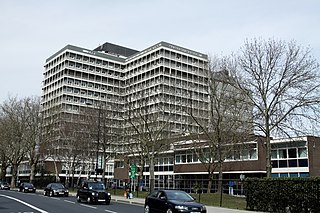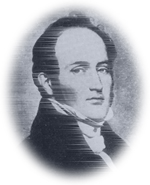| Richard Norris Wolfenden | |
|---|---|
Portrait from c.1905. | |
| Born | 1854 |
| Died | 1926 |
| Nationality | British |
| Alma mater | Christ's College, Cambridge; |
| Occupation | physician |
Richard Norris Wolfenden (1854-1926) was an English physician and oceanographer
| Richard Norris Wolfenden | |
|---|---|
Portrait from c.1905. | |
| Born | 1854 |
| Died | 1926 |
| Nationality | British |
| Alma mater | Christ's College, Cambridge; |
| Occupation | physician |
Richard Norris Wolfenden (1854-1926) was an English physician and oceanographer
Wolfenden was educated at Christ's College, Cambridge. [1] He practised as a London physician, and lectured in physiology at the Charing Cross Hospital medical school. [1] He was House Physician at the London Hospital and Senior Physician at the Throat Hospital, Golden Square, London. [1] He founded and edited the Journal of Laryngology and Rhinology. [1]

Christ's College is a constituent college of the University of Cambridge. The college includes the Master, the Fellows of the College, and about 450 undergraduate and 170 graduate students. The college was founded by William Byngham in 1437 as God's House. In 1505, the college was granted a new royal charter, was given a substantial endowment by Lady Margaret Beaufort, and changed its name to Christ's College, becoming the twelfth of the Cambridge colleges to be founded in its current form. The college is renowned for educating some of Cambridge's most famous alumni, including Charles Darwin and John Milton.

Charing Cross Hospital is an acute general teaching hospital located in Hammersmith, London, United Kingdom. The present hospital was opened in 1973, although it was originally established in 1818, approximately five miles east, in central London.
As well as his medical practice, Wolfenden also interested himself in oceanography. [2] Together with George Herbert Fowler, Wolfenden founded the Challenger Society for Marine Science in 1903.
George Herbert Fowler was an English zoologist, historian and archivist.

The Challenger Society for Marine Science is a learned society established in 1903 in the United Kingdom around the interdisciplinary subject of marine science. The central objectives of the Challenger Society are:

Prosper Ménière was a French doctor who first identified a medical condition combining vertigo, hearing loss and tinnitus, which is now known as Ménière's disease.
Ear candling, also called ear coning or thermal-auricular therapy, is an alternative medicine practice claimed to improve general health and well-being by lighting one end of a hollow candle and placing the other end in the ear canal. Medical research has shown that the practice is both dangerous and ineffective and does not help remove earwax or toxicants.

Frederick William Pavy was a British physician and physiologist and the discoverer of Pavy's disease, a cyclic or recurrent physiologic albuminuria.
Wolfenden may refer to any of the following:

Jacob Hermann Knapp, also known as Hermann Knapp, was a German-American ophthalmologist and otolaryngologist.
Charles Skinner Hallpike, CBE, FRS was an English otologist.
Tympanosclerosis is a condition caused by hyalinization and subsequent calcification of subepithelial connective tissue of TM and middle ear, sometimes resulting in a detrimental effect to hearing.

Frederic John Farre was an English physician.
Sir Victor Ewings Negus, MS, FRCS was a British surgeon who specialised in laryngology and also made fundamental contributions to comparative anatomy with his work on the structure and evolution of the larynx. He was born and educated in London, studying at King's College School, then King's College London, followed by King's College Hospital. The final years of his medical training were interrupted by the First World War, during which he served with the Royal Army Medical Corps. After the war, he qualified as a surgeon and studied with laryngologists in France and the USA before resuming his career at King's College Hospital where he became a junior surgeon in 1924.
Urban Pritchard was a British otologist who made important contributions to understanding of the organ of Corti.

Charles Arthur Mercier M.D., FRCP, FRCS was a British psychiatrist and leading expert on forensic psychiatry and insanity.

Sir St Clair Thomson was a British surgeon and professor of laryngology.
Sir Donald Frederick Norris Harrison was a British surgeon

Charles Handfield Jones (1819–1890) was an English physician.
George Neville Griffiths was an Australian politician.
Dr Peter McBride FRSE (1854–1946) was a Scottish physician and expert on the larynx. In 1897 he was first to identify the malignant granuloma of the nose known as Granuloma Syndrome or granulomatosis with polyangiitis. Edinburgh’s McBride Lecture was named in his honour in 1979.
Arthur Logan Turner FRCSEd FRSE LLD was a Scottish surgeon, who specialised in diseases of ear, nose and throat (ENT) and was one of the first surgeons to work at the purpose-built ENT Pavilion at the Royal Infirmary of Edinburgh. During his surgical career he published a series of clinical papers and wrote a textbook of ENT surgery which proved popular around the world and ran to several editions. After retiring from surgical practice he pursued his interest in the history of medicine writing a biography of his father and histories of the Royal Infirmary of Edinburgh and the University of Edinburgh. As his father had been before him, he was elected President of the Royal College of Surgeons of Edinburgh. His collection of pathological specimens was donated to Surgeon's Hall Museum in Edinburgh..

John Davy Rolleston FSA FRCP was an English physician and folklorist, who published extensively on infectious diseases and the history of medicine. Overshadowed by his brother, Sir Humphry Rolleston, he established himself as an epidemiologist, gave the Fitzpatrick Lecture at the Royal College of Physicians in 1935-1936 and became involved in numerous other learned societies and medical bodies, including The Royal Society of Medicine and the Society for the Study and Cure of Inebriety.
The foramen tympanicum, or also known as the foramen of Huschke, is an anatomical variation of the tympanic part of the temporal bone in humans resulting from a defect in normal ossification during the first five years of life. The structure was found in 4.6% to as high as 23% of the population.
| This article about an English scientist is a stub. You can help Wikipedia by expanding it. |
| This biographical article about a geographer is a stub. You can help Wikipedia by expanding it. |